

FBI’s flawed forensics expert testimony: Hair analysis, bite marks, fingerprints, arson. Photo by Victorburnside/Thinkstock For more stories like this, like Slate on Facebook and follow us on Twitter.
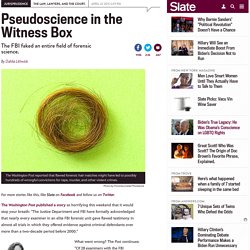
The Washington Post published a story so horrifying this weekend that it would stop your breath: “The Justice Department and FBI have formally acknowledged that nearly every examiner in an elite FBI forensic unit gave flawed testimony in almost all trials in which they offered evidence against criminal defendants over more than a two-decade period before 2000.” Dahlia Lithwick writes about the courts and the law for Slate. What went wrong? FBI admits flaws in hair analysis over decades. The Justice Department and FBI have formally acknowledged that nearly every examiner in an elite FBI forensic unit gave flawed testimony in almost all trials in which they offered evidence against criminal defendants over more than a two-decade period before 2000.
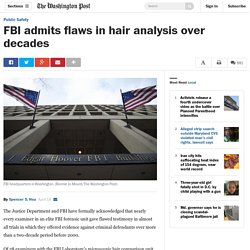
Of 28 examiners with the FBI Laboratory’s microscopic hair comparison unit, 26 overstated forensic matches in ways that favored prosecutors in more than 95 percent of the 268 trials reviewed so far, according to the National Association of Criminal Defense Lawyers (NACDL) and the Innocence Project, which are assisting the government with the country’s largest post-conviction review of questioned forensic evidence. The cases include those of 32 defendants sentenced to death. Of those, 14 have been executed or died in prison, the groups said under an agreement with the government to release results after the review of the first 200 convictions. How the flawed ‘science’ of bite mark analysis has sent innocent people to prison. This is part one in a four-part series.
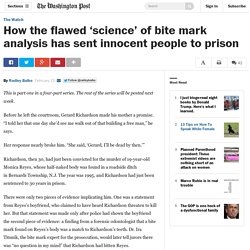
The rest of the series will be posted next week. Only on ABC7News.com: San Francisco crime lab whistleblower says scandal date... More questions are being raised about the reliability of the San Francisco crime lab.
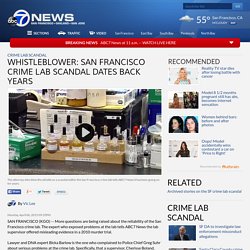
The expert who exposed problems at the lab tells ABC7 News the lab supervisor offered misleading evidence in a 2010 murder trial. Lawyer and DNA expert Bicka Barlow is the one who complained to Police Chief Greg Suhr about serious problems at the crime lab. Warning by spending watchdog over forensic science work. 21 January 2015Last updated at 12:27 ET Forensic science standards risk slipping since work was transferred to in-house police labs and private firms, the spending watchdog has warned.
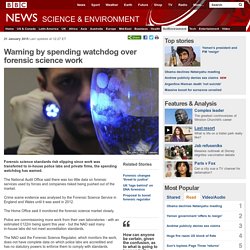
World's End forensic scientist findings 'misguided' 5 November 2014Last updated at 13:24 ET Christine Eadie and her friend Helen Scott were killed in October 1977 A forensic scientist in the World's End trial has been accused of making are "misguided, unjustified and positively misleading" findings in her report.
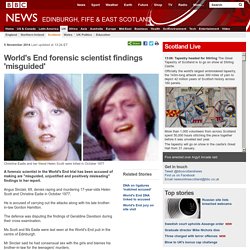
Angus Sinclair, 69, denies raping and murdering 17-year-olds Helen Scott and Christine Eadie in October 1977. Fire incompetent people - forensic expert. Cape Town - Competence, common sense, and competitive wages are all that is needed to vastly improve the performance of the State's forensic laboratories, forensic expert David Klatzow said on Wednesday.
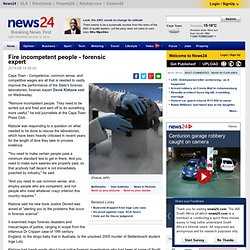
"Remove incompetent people. They need to be sorted out and fired and sent off to do something more useful," he told journalists at the Cape Town Press Club. Klatzow was responding to a question on what needed to be done to rescue the laboratories, which have been heavily criticised in recent years for the length of time they take to process evidence. "You need to make certain people pass a minimum standard test to get in there. And you need to make sure salaries are properly paid, so that anybody half decent is not immediately poached by industry," he said. "And you need to use common sense, and... employ people who are competent, and not people who meet whatever crazy criterion this country requires. " Forensic Science Northern Ireland: Senior scientist leaves job after inquiry. 13 June 2014Last updated at 12:30 ET By Julian O'Neill BBC News NI Forensic Science Northern Ireland is a government agency that provides "impartial forensic science to support justice" and carries out work on behalf of both the prosecution and defence in criminal cases A senior scientist at a government agency is to leave his post after an investigation by Northern Ireland's Department of Justice (DoJ).
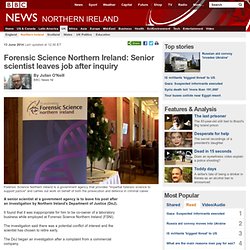
Error Rates – Limitations and Realities. How do you define error rate?
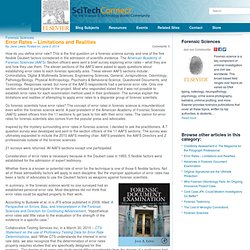
This is the first question on a forensic science survey and one of the five flexible Daubert factors considered in the admission of scientific evidence. The American Academy of Forensic Sciences (AAFS) Section officers were sent a brief survey exploring error rates – what they are and how they use them. The eleven sections of the AAFS were asked to apply questions about establishing error rates to each forensic specialty area. These eleven AAFS sections include: Criminalistics, Digital & Multimedia Sciences, Engineering Sciences, General, Jurisprudence, Odontology, Pathology/Biology, Physical Anthropology, Psychiatry & Behavioral Science, Questioned Documents, and Toxicology.
Responses varied, but none of the AAFS respondents had a personal error rate. Do forensic scientists have error rates? Inspired by the mystery surrounding error rates in forensic science, I decided to ask the practitioners. 21 surveys were returned. Op-Ed: DNA laboratory fraud revealed in Amanda Knox case (Includes interview) New information in the Meredith Kercher Murder case has now emerged alleging that Patrizia Stefanoni, the lab technician responsible for DNA testing on behalf of the prosecution, committed scientific misconduct by suppressing data from faulty equipment and falsifying evidence in order to support the prosecution’s case.
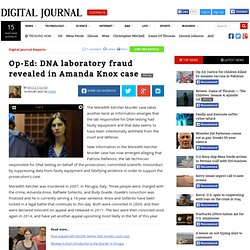
Meredith Kercher was murdered in 2007, in Perugia, Italy. Three people were charged with the crime, Amanda Knox, Raffaele Sollecito, and Rudy Guede. Guede’s conviction was finalized and he is currently serving a 16-year sentence. California’s Senate has approved an important new forensics bill. California’s state Senate has just approved an important new bill that would help people convicted of crimes due to bad science win new trials. Let’s hope it gets passed into law. One of the most important things we’ve learned from DNA testing is that we have badly misjudged the reliability of a number of methods of forensic analysis. Most fields of forensics were developed by police investigators, not scientists, and aren’t subject to the rigorous standards of the scientific method, such as blind testing and peer review.
Yet these methods are still presented to juries as “science.” In 2009, the National Academy of Sciences issued a groundbreaking and disturbing report on how forensic analysis is used in America’s courtrooms. One problem with using even actual science in criminal cases is that science is always evolving. Faulty forensic science under fire. David Duprey/AP There is little evidence that bite marks on a crime victim’s skin allow reliable identification of the perpetrator. For 19 years, Gerard Richardson sat in prison in New Jersey wondering how forensics experts had got his case so wrong. His conviction for a 1994 murder was based on a bite mark on the victim’s body that seemed to match his own teeth; it was the main physical evidence linking him to the crime. Last year, he was exonerated when DNA taken from the same bite mark turned out not to be his. Hair Analysis: The Root of the Evidence Problem.
Report Details the Extent of a Crime Lab Technician’s Errors in Handling Evidence. Examining The 'Red Flags' In A Massachusetts Crime Lab Scandal. Extended Coverage WBUR has more on Annie Dookhan and the Massachusetts drug lab crisis, including: a timeline of events data from 58,070 drug test that Dookhan performed videos on the case updated news coverage See badchemistry.WBUR.org. hide captionFormer state chemist Annie Dookhan, left, stands alongside her attorney on Friday.
She admitted faking test results in criminal cases and was sentenced to 3-to-5 years in prison. David L. Science Needed To Help Free Innocent Prisoners. Lee Rannals for redOrbit.com – Your Universe Online Thousands of convicted inmates are sitting in a prison, including dozens on death row, that are innocent, but one project is collaborating with the American Chemical Society (ACS) to try and keep forensic experts accountable to science.
Forensic scientists, attorneys and others that are a part of The Innocence Project put out a call to scientists at the 244th National Meeting & Exposition of the American Chemical Society to get involved in trying to exonerate convicted people in the prison system. In recent years, forensic scientists have come under scrutiny, particularly after being called out by the National Academy of Sciences. Dr. Make forensic evidence meet standards of science. By Cliff Spiegelman, William A. Tobin For decades, largely unrealized by judges, many of the forensic practices admitted into judicial proceedings have been without scientific foundation or any other logically acceptable basis other than observational (inductive) study by experimenters untrained in experimental process.
Most troubling are the declarations of certainty associated with proffered expert opinions in those unfounded practices as expressed by examiners in criminal proceedings, such as in firearm/toolmark identification. Despite the lack of true scientific foundation, firearm/toolmark examiners typically state to a practical certainty that a defendant’s gun was the only possible firearm that could have fired the fatal bullet in a murder. The identification is made on the basis of scratches (striae) and/or impressions on the bullets and comparisons with defendants’ guns. Michael Blair was condemned to death for the 1993 molestation and murder of a 7-year-old girl.
ROCKEFELLER?S BILL ON FORENSICS WILL REDUCE WRONGFUL CONVICTIONS - Press Releases - Press Room - United States Senator Jay Rockefeller. WASHINGTON, D.C. – Senator Jay Rockefeller today said experts on forensic science research in West Virginia provided valuable insights into new legislation aimed at reducing wrongful convictions across the country. The legislation, the Forensic Science and Standards Act of 2012, comes on the heels of national concern that some criminal justice proceedings use evidence developed through flawed forensic work.
Rockefeller’s bill would strengthen forensic science and standards, yielding evidence that judges, prosecutors, defendants, and juries can fully trust. Rockefeller, Chairman of the Senate Committee on Commerce, Science and Transportation, introduced the bill last week. West Virginia is a national leader in forensics, with highly regarded academic programs at West Virginia University and Marshall University. Forensics on the Hill: Part I - The Huffington Post. Forensic Regulator codes-practice-conduct.